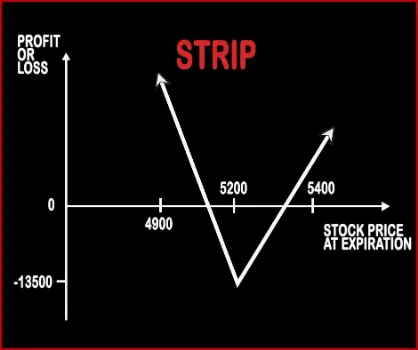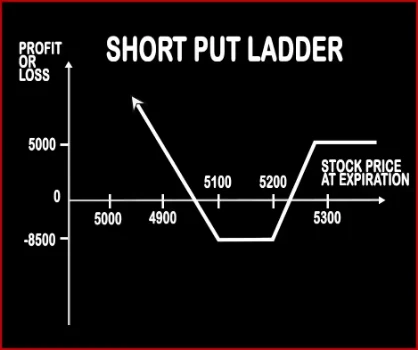Compare Strategies
| STRIP | SHORT PUT LADDER | |
|---|---|---|

|

|
|
| About Strategy |
Strip Option StrategyStrip Strategy is the opposite of Strap Strategy. When a trader is bearish on the market and bullish on volatility then he will implement this strategy by buying two ATM Put Options & one ATM Call Option, of the same strike price, expiry date & underlying asset. If the prices move downwards then this strategy will make more profits compared to short straddle because of the |
Short Put Ladder Option StrategyThis strategy is implemented when a trader is slightly bearish on the market. A trader is required to be bullish over the volatility in the market. It involves sale of an ITM Put Option and buying of 1 ATM & 1 OTM Put Options. However, the risk associated with this strategy is limited.
|
STRIP Vs SHORT PUT LADDER - Details
| STRIP | SHORT PUT LADDER | |
|---|---|---|
| Market View | Neutral | Neutral |
| Type (CE/PE) | CE (Call Option) + PE (Put Option) | PE (Put Option) |
| Number Of Positions | 3 | 3 |
| Strategy Level | Beginners | Advance |
| Reward Profile | Unlimited | Unlimited |
| Risk Profile | Limited | Limited |
| Breakeven Point | Upper Breakeven Point = Strike Price of Calls/Puts + Net Premium Paid, Lower Breakeven Point = Strike Price of Calls/Puts - (Net Premium Paid/2) | Upper Breakeven Point = Strike Price of Short Put - Net Premium Received Lower Breakeven Point = Total Strike Prices of Long Puts - Strike Price of Short Put + Net Premium Received |
STRIP Vs SHORT PUT LADDER - When & How to use ?
| STRIP | SHORT PUT LADDER | |
|---|---|---|
| Market View | Neutral | Neutral |
| When to use? | When a trader is bearish on the market and bullish on volatility then he will implement this strategy. | This strategy is implemented when a trader is slightly bearish on the market. |
| Action | Buy 1 ATM Call, Buy 2 ATM Puts | Sell ITM Put Option, Buying 1 ATM & 1 OTM Put Option. |
| Breakeven Point | Upper Breakeven Point = Strike Price of Calls/Puts + Net Premium Paid, Lower Breakeven Point = Strike Price of Calls/Puts - (Net Premium Paid/2) | Upper Breakeven Point = Strike Price of Short Put - Net Premium Received Lower Breakeven Point = Total Strike Prices of Long Puts - Strike Price of Short Put + Net Premium Received |
STRIP Vs SHORT PUT LADDER - Risk & Reward
| STRIP | SHORT PUT LADDER | |
|---|---|---|
| Maximum Profit Scenario | Price of Underlying - Strike Price of Calls - Net Premium Paid OR 2 x (Strike Price of Puts - Price of Underlying) - Net Premium Paid | When Price of Underlying < Total Strike Prices of Long Puts - Strike Price of Short Put + Net Premium Received |
| Maximum Loss Scenario | Net Premium Paid + Commissions Paid | Strike Price of Short Put - Strike Price of Higher Strike Long Put - Net Premium Received + Commissions Paid |
| Risk | Limited | Limited |
| Reward | Unlimited | Unlimited |
STRIP Vs SHORT PUT LADDER - Strategy Pros & Cons
| STRIP | SHORT PUT LADDER | |
|---|---|---|
| Similar Strategies | Strap, Short Put Ladder | Strap, Strip |
| Disadvantage | Expensive., The share price must change significantly to generate profit., High Bid/Offer spread can have a negative influence on the position. | • Best to use when you are confident about movement of market. • Small margin required. |
| Advantages | Profit is generated when the share price changes in any direction., Limited loss., The profit is potentially unlimited when share prices are moving. | • When there is surge in implied volatility, this strategy can give more profit. • Unlimited downside profit. • Limited risk and unlimited reward strategy. |